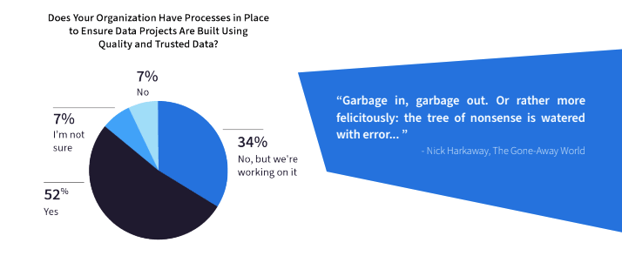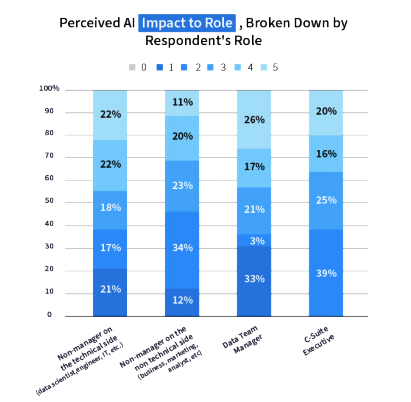In the second half of 2019, Dataiku put on EGG, the Human-Centered AI Conference, in four cities across North America and Europe. More than 400 data professionals in San Francisco, Amsterdam, Paris, and Stuttgart responded to the AI Impact Survey. What did we learn?
For the full scoop, get the ebook that breaks down the results and includes recommendations as well as best practices for organizations looking to scale AI.
Data Quality Is Still a Challenge
With topics like trust, explainability, responsibility, and ethics at the forefront of discussions in AI for the decade to come, we asked respondents about how their organizations manage these challenges. Overall, only 52 percent of respondents said that yes, their organizations have processes to ensure data projects are built using quality, trusted data.

Curiously, when broken down by respondent persona, 72 percent of c-suite executives responded “yes” to this question. Perhaps this connects back to the top-down vs. bottom-up approach to AI efforts. Do the processes exist in theory, but not in practice? Is it a question of communication on both ends of the spectrum? How can organizations better alight on these processes from top to bottom and ensure that executives as well as practitioners are aligned? These are all important questions that enterprises should work to address in order to succeed.
Inclusive AI: In Theory, or In Practice?
Overall, inclusive AI encompasses the idea is that the more people are involved in AI processes, the better the outcome (both internally and externally) because of a diversification of skills, points of view, or use cases. Practically within a business, it means not restricting the use of data or AI systems to specific teams or roles, but rather equipping and empowering everyone at the company to make day-to-day decisions, as well as larger process changes, with data at the core. The model today for traditional businesses leveraging AI seems to lean more toward data democratization, or inclusive AI, for its larger potential to scale.
In theory, given this trend, non-managers in non-technical roles (business professionals in marketing, risk, operations, etc.) should see - or at least see the potential for - AI impact in their jobs. In practice, only about 11 percent of non-managers in a non-technical role (like business, marketing, analysts, etc.) responded that they thought AI would “completely” change their role (i.e., a 5 on the scale) - a much lower percentage than the other roles.

AI will undoubtedly have some impact on individuals in their jobs, the companies for which they work, and their larger industries. To what extent remains to be seen, but one thing is for sure: there are certainly lingering questions around trust and responsibility that need to be addressed before AI can have a maximum (and positive) result.




